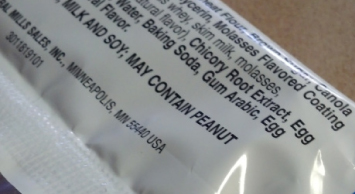Potential cure for peanut allergies discovered

According to PeanutAllergy.com, 3 million people in the United States alone are allergic to peanuts, tree nuts or both.
The peanut allergy affects people during every meal, causing them to stress over knowing every ingredient prior to eating any meal for the fear that they might ingest what their body deemed poisonous. Approximately 125 people die every year due to food allergies in the United States, with most being from severe peanut allergies. During a severe peanut allergic reaction, the allergy sufferer may experience anaphylaxis; a life-threatening allergic reaction. The symptoms include constriction of the airways, throat swelling, rapid pulse, dizziness and unconsciousness. Not only does having severe allergies affect the sufferer’s physical self, but their emotional and social lives as well.
“Bullying and exclusion are absolutely one of the worst feelings that come with having food allergies and I would never want someone to go through that,” Hannah Shumsky, member of the Mid-atlantic Teen Advisory Group for Food Allergy Research & Education (FARE), said.
Unfortunately, many of the sufferers are children who aren’t as thoughtful to the severity of their allergy or what the ingredients are in what they’re consuming. Peanuts are especially hard for children to avoid because it’s a common component in candy, ice cream and many more common foods consumed. This poses as a major danger to the younger sufferers. Their peanut allergy could easily take their life with a simple bite of a cookie.
Peanut allergy sufferers of all ages, now, have hope for mild or total relief from their crippling allergy. Researchers at Murdoch Children’s Research Institute in Australia are hopeful that they may have found a cure, or at least a mild remedy, to peanut allergies. The mysterious remedy is a probiotic protein found in fermented food and yogurt, which has been proven to take away all symptoms of deadly peanut allergies in 80 percent of the children studied. The remaining 20 percent still had a mild or even severe allergic reaction to peanuts.
“Many of the children and families believe it has changed their lives, they’re very happy, they feel relieved,” Mimi Tang, the lead researcher, said.
The participants were given a daily dose of peanut protein with a probiotic Lactobacillus rhamnosus for 18 months. Lactobacillus rhamnosus helps maintain the balance of good bacteria needed to prevent the growth of harmful bacteria in the stomach and intestines. The amount of dosage grew gradually throughout the year-and-a-half study. The amount of protein in the probiotic is equivalent to eating a staggering 44 pounds of yogurt daily. The protein probiotic, though it’s by no means 100 percent effective, is a definite breakthrough in the world of peanut allergy remedies.
“These findings provide the first vital step towards developing a cure for peanut allergies and possibly other food allergies,” Tang said.


